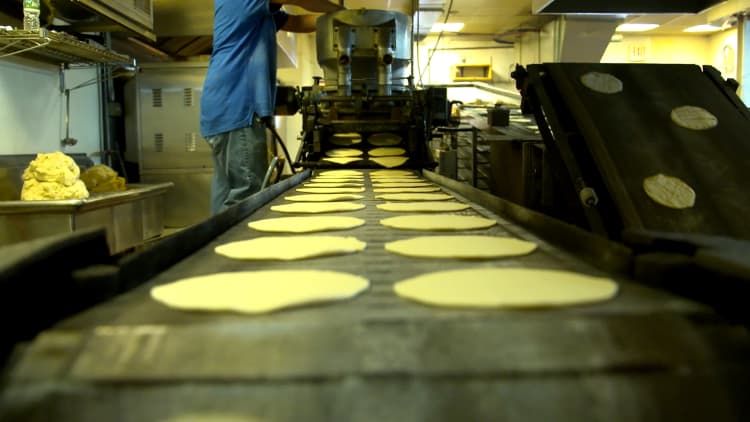When Adelo Ramirez came to America at age five with little money or resources, no one suspected that he would, by 2000, open a successful, critically acclaimed restaurant, Los Gemelos, in Port Chester, New York.
Ramirez worked three jobs, slept four hours a night, and saved up $40,000 of his own money so that he could use his passion for cooking to start a business.
By 2006, Ramirez had new ambitions: to manufacture tortillas for sale in local grocery stores. Not long after, he decided he wanted to become the biggest tortilla manufacturer in the world.
Unfortunately, that dream fell short. Though Ramirez's revenues approached half a million dollars shortly after he launched his tortilla line, by 2010, another large tortilla brand, Mission, had come to the east coast and "knocked us out big time," says Ramirez. Sales plummeted. Last year, Ramirez's revenue was just $220,000.
But on the latest episode of "The Profit," Ramirez redoubles his efforts to transform his struggling tortilleria into a major food brand with the help of entrepreneur Marcus Lemonis.
To become a global brand, Lemonis instructs Ramirez to make some changes. First, he has to close his shabby tortilla factory, which hasn't been complying with U.S. safety standards and is bleeding money. Then he has to start a new Hispanic food company.
The market for Hispanic foods is growing, according to Lemonis, and worth $18 billion in the U.S. alone.
Rather than focus exclusively on tortillas, Lemonis encourages Ramirez to pick three or four products that Mexican and non-Mexican communities would love.
"We want these products to be authentic but we want to make sure they appeal to everyone all over the country," Lemonis says. "We want to focus on the meat of the market right in the core, not on the fringes."
To determine the products in the market core, Ramirez and Lemonis meet with food distributor Tapia Brothers, a large, west coast distribution house familiar with the Hispanic market. Based on his knowledge of distribution, Erik Tapia, vice president of sales, recommends a trio of approachable, widely beloved products: chips, salsa, and tortillas.
Lemonis and Ramirez also do market research. They visit the popular grocery chain Gelson's in Los Angeles to see what Mexican products make the shelves. They find chips, salsa, and tortillas, but no mole, pan dulce or tamales — so Lemonis encourages Ramirez to stay away from those.
"While there may be little competition there, there is also little very demand," Lemonis explains.
Though chips, salsa, and tortillas are all products with lots of marketplace competition, Ramirez's offerings could still stand out, thanks to his partnership with comedian and actor George Lopez. Lopez has become a champion of Ramirez's restaurant and food business and agreed to lend recognition to the new brand in return for equity in the business and royalties.
Ramirez, Lemonis, and Lopez decide to name their new brand "Ta Loco," an homage to one of George Lopez's sayings. A cartoon of George Lopez's face will adorn the packaging.
The "Ta Loco" team will also create their products using fresh ingredients and home-made Mexican recipes – their plan is to remain authentic while also appealing to the masses.
Ramirez will not manufacture the foods himself; instead he'll partner with LA-based La Fortaleza, a manufacturer embedded in the Hispanic foods market. La Fortaleza already makes its tortillas with real corn and can ensure "Ta Loco" tortillas will have an authentic, traditional flavor while being able to deliver high capacity, too.
By the end of the episode, after employing Lemonis' recommendations, Ramirez successfully pitches the "Ta Loco" line of foods to warehouse retail chain Sam's Club.
"If you can nail Sam's Club, the sky's the limit," Lemonis says.
CNBC's "The Profit" airs Tuesdays at 9 p.m. EDT.




